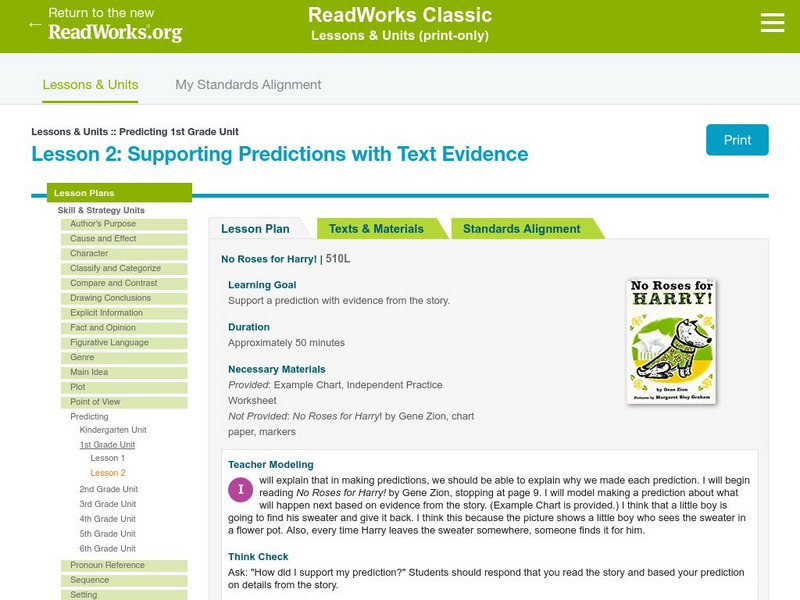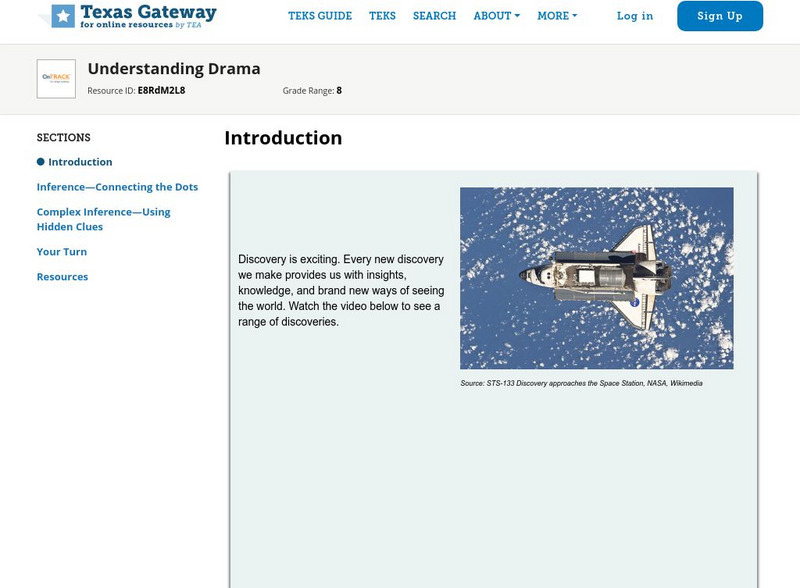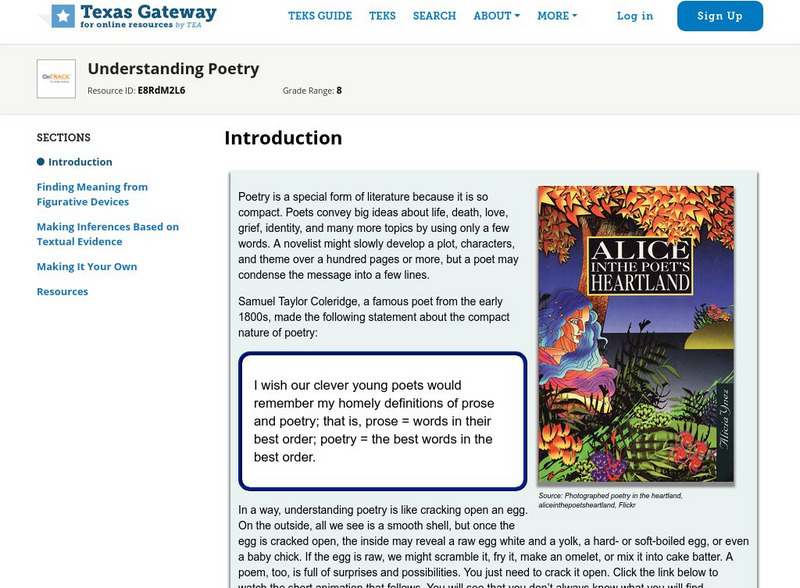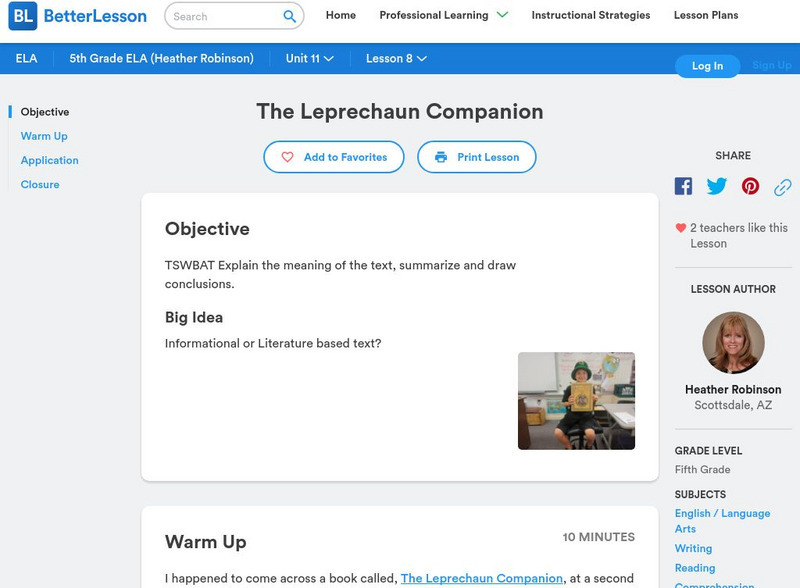Better Lesson
Better Lesson: What the Heck Is That? Inferring the Purpose of an Object
In this lesson, 5th graders use their prior knowledge and inference skills to determine uses of unfamiliar objects. They participate in group discussions and analyze the key information they have in order to reach conclusions.
Texas Education Agency
Texas Gateway: Relevant Information and Valid Inferences (English I Writing)
[Accessible by TX Educators. Free Registration/Login Required] An inference is a guess based on the information within a situation. It is valid if the guess is logical. This lesson teaches you how to check a completed draft for relevant...
PBS
Pbs Teachers: Dead Men's Tales: Inferring Height From Bone Length
Explore the work of forensic scientists by inferring an individual's height from the length of certain long bones. Create bone/height relation charts and measure length using metric units. This activity was created to be used with the...
AdLit
Ad lit.org: Teach the Seven Strategies of Highly Effective Readers
To improve students' reading comprehension, teachers should introduce the seven cognitive strategies of effective readers: activating, inferring, monitoring-clarifying, questioning, searching-selecting, summarizing, and...
TES Global
Tes: Coraline 5 Reading Assessment
[Free Registration/Login Required] This lesson plan provides a way to assess students' understanding of inferences about the traits of characters in the Neil Gaiman's novel Coraline.
AdLit
Ad lit.org: Classroom Strategies: Inferential Reading
Teaching students to "read influentially" helps them learn how to read more strategically. This technique is derived from the teaching model that learners develop knowledge via the process of interpreting new information in light of past...
Read Works
Read Works: Predicting 3rd Grade Unit
[Free Registration/Login Required] This is a instructional activity designed to teach students to make predictions based on relationships between characters. The instructional activity is based on the book Soupy Saturdays with the Pain...
Read Works
Read Works: Predicting 1st Grade Unit
[Free Registration/Login Required] A two-lesson unit designed to teach students to make predictions and support them with details from the text. Lessons are based on the books Wemberly Worried by Kevin Henkes and No Roses for Harry! by...
Other
The Critical Thinking Consortium: A Teacher's Guide to the Gardener [Pdf]
The Gardener by Sarah Stewart won the Caldecott Honor in 1998. It centres around a set of letters about a young girl who moved from the countryside to the city. In the lessons in this teaching guide, students must make inferences from...
Other
Wisconsin Educational Communication Board: Into the Book
This series of videos and interactive activities provide an excellent set of resources for teaching or learning the 8 research based reading strategies provided here. After receiving your "key" you can investigate the features inside and...
University of Maryland
Voices of Democracy: John Fitzgerald Kennedy, "Inaugural Address" January 1961
John F. Kennedy's inaugural speech is one of the most famous speeches in American history. Teachers can use this lesson to teach Language Arts standards, as well as Social Studies standards. This lesson plan includes pre-reading ideas,...
Read Works
Read Works: 1st Grade Unit: Supporting Predictions
[Free Registration/Login Required] A lesson utilizing the book No Roses for Harry! by Gene Zionin in which students make a prediction and then support it with details from the text. Ideas for direct teaching, guided practice, and...
National Endowment for the Humanities
Neh: Edsit Ement: Introducing the Essay: Twain, Douglass and American Non Fiction
This lesson plan serves as an introduction to American literary non-fiction writing and focuses primarily on teaching some basic approaches to recognizing rhetorical strategies adopted for persuasive effect in essays and non-fiction. The...
Read Works
Read Works: Grade 1: Three Lesson Unit: Character: Actions, Feelings, Looks
[Free Registration/Login Required] A series of three lesson plans, based on David Shannon's books No, David!, David Gets in Trouble, and David Goes to School. Students learn how to utilize text and picture clues to determine and describe...
Read Works
Read Works: Drawing Conclusions Kindergarten Unit: Short Story
[Free Registration/Login Required] A lesson plan teaching students to make conclusions based on a sentences and short texts. Students use textual cues to explain how the conclusions were reached. Ideas for direct teaching, guided...
National Endowment for the Humanities
Neh: Edsit Ement:narrative and Persona in the Poetry of Robert Frost
Using Frost's famous poem, "Stopping by the Woods on a Snowy Evening" as an example of narrative poetry, students explore the artistry and significance of the narrative poem. In addition, this lesson plan provides suggestions for writing...
PBS
Pbs: Multiple Methods of Reading Instruction
This article surveys three strategies to incorporate into classroom repertoire. They include guided reading, choral reading, and readers' theater.
ClassFlow
Class Flow: Salem Witchcraft Hysteria
[Free Registration/Login Required] This flipchart is an inferencing lesson to introduce the Salem Witch Trials used for teaching The Crucible. Students are presumed to already have background on the Puritans.
PBS
Pbs Teachers: Scientific American: Life's Big Questions: Hands On, Minds On
Make inferences about the structure and function of human hands. Investigate the relationship between hand actions and recorded points of contact by exploring hand grasps of a pencil and a broom handle.
PBS
Pbs Teachers: Scientific American: Deep Crisis: Salmon Counting
In this lesson, students can explore the techniques of census and population counting by inferring numbers of a virtual population illustrated within a rectangular sampling grid, and observing the accuracy of the technique in relation to...
Texas Education Agency
Texas Gateway: Understanding Drama
A learning module that teaches students how to understand drama in four mini lessons: Introduction, Inference-Connecting the Dots, Complex Inference-Using Hidden Clues, and Your Turn.
Smithsonian Institution
Smithsonian Learning Lab: Every Picture Has a Story
Smithsonian Education presents "Every Picture Has a Story". Teachers can download this comprehensive teaching package in which students examine some of the millions of photographs in the Smithsonian. This amazing teaching package comes...
Texas Education Agency
Texas Gateway: Understanding Poetry
A learning module that teaches students how to understand poetry in four mini lessons: Introduction, Finding Meaning from Figurative Devices, Making Inferences Based on Textual Evidence, and Making It Your Own.
Better Lesson
Better Lesson: The Leprechaun Companion
In this lesson, 5th graders will explain the meaning of a text and its genre, summarize it, and draw conclusions. They work with a book called The Leprechaun Companion which is a cross between informational and literary text.
Other popular searches
- Teaching Inference Skills
- Teaching Inference Reading
- Teaching Inference Implicit
- Teaching Inference 2nd
- Teaching Inference +Reading



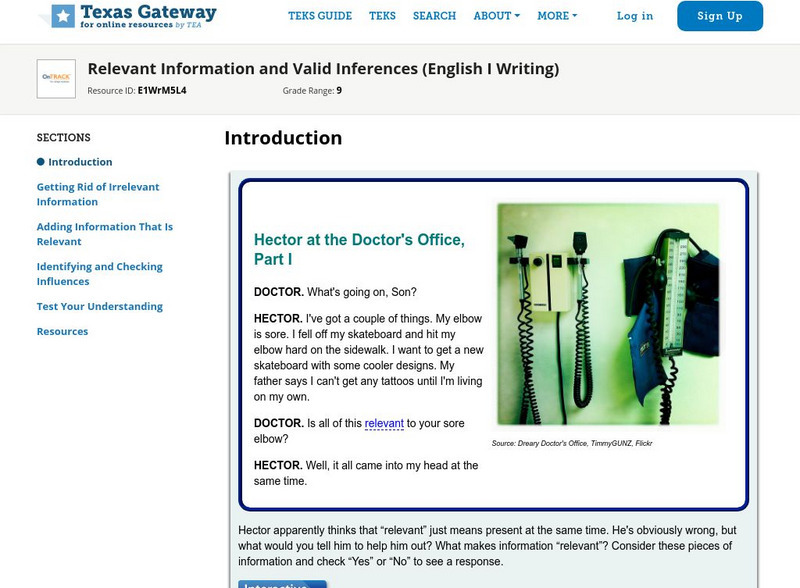




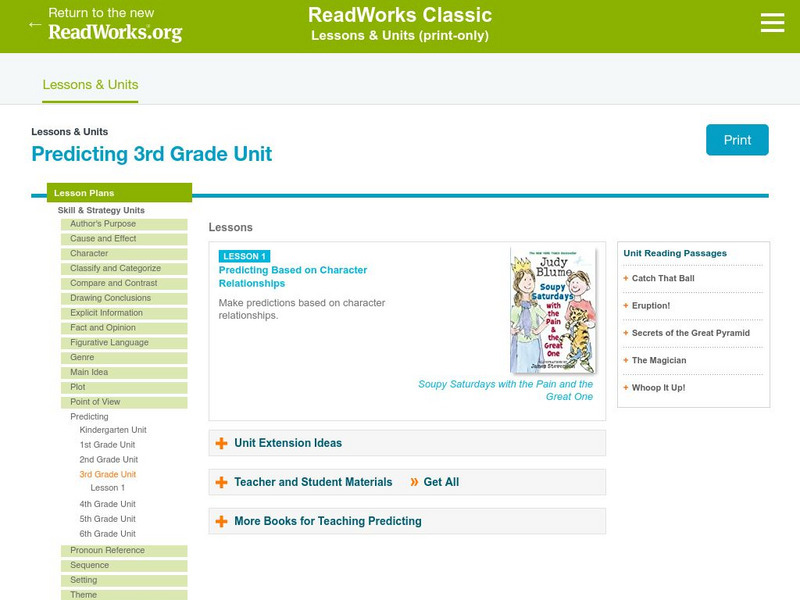

![The Critical Thinking Consortium: A Teacher's Guide to the Gardener [Pdf] Lesson Plan The Critical Thinking Consortium: A Teacher's Guide to the Gardener [Pdf] Lesson Plan](https://d15y2dacu3jp90.cloudfront.net/images/attachment_defaults/resource/large/FPO-knovation.png)


